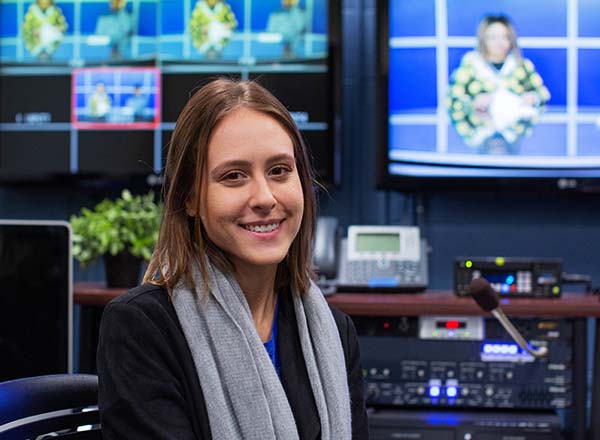Careers to consider: Media Communication Arts

This article is part of a series spotlighting HFC academic and workforce programs leading to great careers. To view all HFC programs, visit this link.
HFC’s media communication arts program provides a strong foundation that covers the history of mass media, current media concepts and theories, and future trends in the field of communication and media arts.
It also leads to many exciting career options.
You will learn about:
- media production
- editing, writing, and management
- radio
- television
- film
- broadcast journalism
- public relations
- media performance
You will develop broad skills through a wide range of courses including both classroom work and creative hands-on use of hardware, software, studios and labs. You will have real-world experiences, and you will develop skills to immediately enter the media industry or work toward your bachelor’s degree at a 4-year university.
The media communication arts program has several transfer agreements with universities such as:
- Baker College
- Davenport University
- Eastern Michigan University
- Wayne State University
- Oakland University
What class will you take first?
The first class in the program is TCM 131: Introduction to Telecommunication. This class guides you in investigating electronic communication media and print media from historical, economic, ethical, and social viewpoints. The class analyzes things such as the impact video games have on society, deepfakes and their potential harm to others, how to analyze our media literacy and why that matters, global media and the impact of U.S. news on us and other nations, and theories that social media companies are really in control of what we think, feel, and do. We analyze the past to get a handle on the present and to be prepared for what’s to come in the future of media.
This class is an excellent introduction to the media communication arts coursework and it serves as an elective in most programs. Sign up and find out!
Media communication arts classes are offered online, on-campus, or in hybrid formats to fit with your schedule. The hands-on experience on campus for the production/editing and performance classes is invaluable.
How should you set up your class schedule?
Here is the recommended sequence of classes for you to take.
We always recommend you talk to one of our friendly, expert advisors to make sure you are on the right track.
What will you learn?
You will gain knowledge and experience in a broad range of specialties, including:
- Film history and criticism
- Video and audio production and editing
- Performing for the media/voiceover work
- Media writing – scripts, commercials, writing for the web
- Broadcast journalism
You will work in our excellent, state-of-the-art facilities:
- Mac editing lab
- TV studio and control room
- WHFR-FM, HFC’s commercial-free, independently-owned and operated student-run radio station
- Equipment checkout room for hands-on student learning
- New in Fall 2022: Foley sound room for specialized audio recording projects
When you graduate from this program, you will be able to:
- Assess issues relating to media literacy and ethics using practices of media criticism
- Demonstrate telecommunication/media arts skills, including media writing, script analysis, audio and video performance, and criticism
- Implement the use of industry-standard software and hardware to produce and edit audio and video works
- Examine historical and contemporary issues as they apply to the legal aspects of the telecommunication industry
- Solve problems by collaborating with team members on a telecommunication/media arts project in an ensemble writing, production, performance, editing or directing environment
- Enjoy a fun, rewarding career in one of the many exciting media-related industries!
Some possible career options:
- Management: producer, director, or promotions coordinator
- Production: video or television producer, director, camera operator, audio or radio producer, or audio or video producer
- Writing: screenwriter, script writer, media theorist, media critic, or broadcast news journalist
- Talent: radio, TV, or voiceover announcer, broadcast news journalist, or performer
“I received real world preparation for real world success through HFC’s media communication arts program,” said recent HFC alumnus D. Mark Hall. “It is just as cutting edge as anything you will see at a 4-year university.”
Questions? Contact:
Susan McGraw, Chair of Media Communication Aarts and WHFR General Manager, at 313-845-9842 or scmcgraw@hfcc.edu.